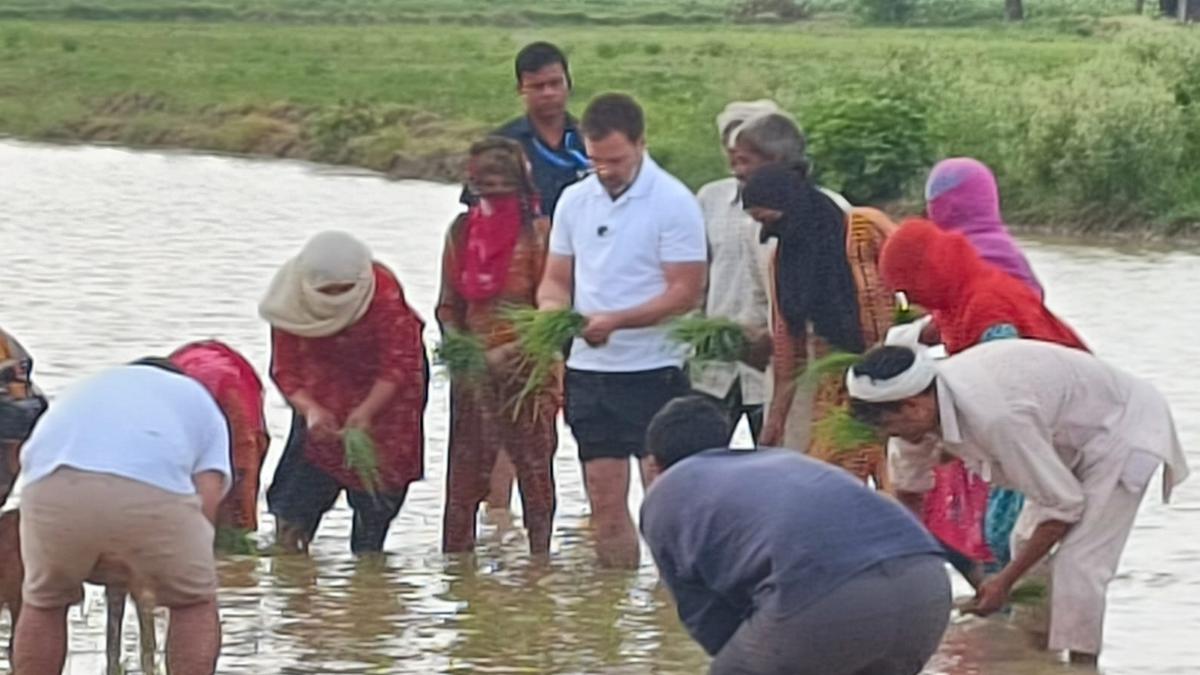
Farmers are India's strength, says Congress leader Rahul Gandhi
The Hindu
Congress leader Rahul Gandhi visits farmers in Haryana, says they are India's strength. He met Sanjay Malik and Tasbir Kumar, ploughed fields, planted paddy saplings, discussed their struggles and dreams. Congress salutes their struggle and believes they are the backbone of India. We must listen to them. #BharatJodoYatra.
Congress leader Rahul Gandhi on July 16 said farmers are India’s strength and many problems of the country could be solved “if we listen to them and understand their point of view”.
Mr. Gandhi shared on social media a video capturing his visit to paddy fields in Madina village of Haryana's Sonepat on July 8.
The about 12-minute YouTube video shows him having a conversation with farmers and their families, ploughing the fields, planting paddy saplings and later breaking bread with the farmers on a string cot.
“Farmers are the strength of India,” he tweeted in Hindi, sharing a short clip from the video. “In Sonepat, Haryana, I met two farmers — Sanjay Malik and Tasbir Kumar. They are childhood best friends and have been farming together for many years.”
“Together with them, we helped in the fields, sowed paddy, drove a tractor, and discussed many things. The women farmers of the village gave us love and respect like their own family members, and brought homemade food.
“The farmers of India are honest and sensible - they know their hard work and also recognise their rights. When needed, they stand firm against black laws and also raise their right for demands of MSP and insurance. If we listen to them, understand their point of view, many problems of the country can be solved,” Mr. Gandhi added.
The Congress also said on Twitter, “Farmers have a huge contribution in uniting India — the grains they produce are part of every plate of the country, but their ‘tapasya’ does not get the respect it deserve””

“Writing, in general, is a very solitary process,” says Yauvanika Chopra, Associate Director at The New India Foundation (NIF), which, earlier this year, announced the 12th edition of its NIF Book Fellowships for research and scholarship about Indian history after Independence. While authors, in general, are built for it, it can still get very lonely, says Chopra, pointing out that the fellowship’s community support is as valuable as the monetary benefits it offers. “There is a solid community of NIF fellows, trustees, language experts, jury members, all of whom are incredibly competent,” she says. “They really help make authors feel supported from manuscript to publication, so you never feel like you’re struggling through isolation.”

Several principals of government and private schools in Delhi on Tuesday said the Directorate of Education (DoE) circular from a day earlier, directing schools to conduct classes in ‘hybrid’ mode, had caused confusion regarding day-to-day operations as they did not know how many students would return to school from Wednesday and how would teachers instruct in two modes — online and in person — at once. The DoE circular on Monday had also stated that the option to “exercise online mode of education, wherever available, shall vest with the students and their guardians”. Several schoolteachers also expressed confusion regarding the DoE order. A government schoolteacher said he was unsure of how to cope with the resumption of physical classes, given that the order directing government offices to ensure that 50% of the employees work from home is still in place. On Monday, the Commission for Air Quality Management in the National Capital Region and Adjoining Areas (CAQM) had, on the orders of the Supreme Court, directed schools in Delhi-NCR to shift classes to the hybrid mode, following which the DoE had issued the circular. The court had urged the Centre’s pollution watchdog to consider restarting physical classes due to many students missing out on the mid-day meals and lacking the necessary means to attend classes online. The CAQM had, on November 20, asked schools in Delhi-NCR to shift to the online mode of teaching.









